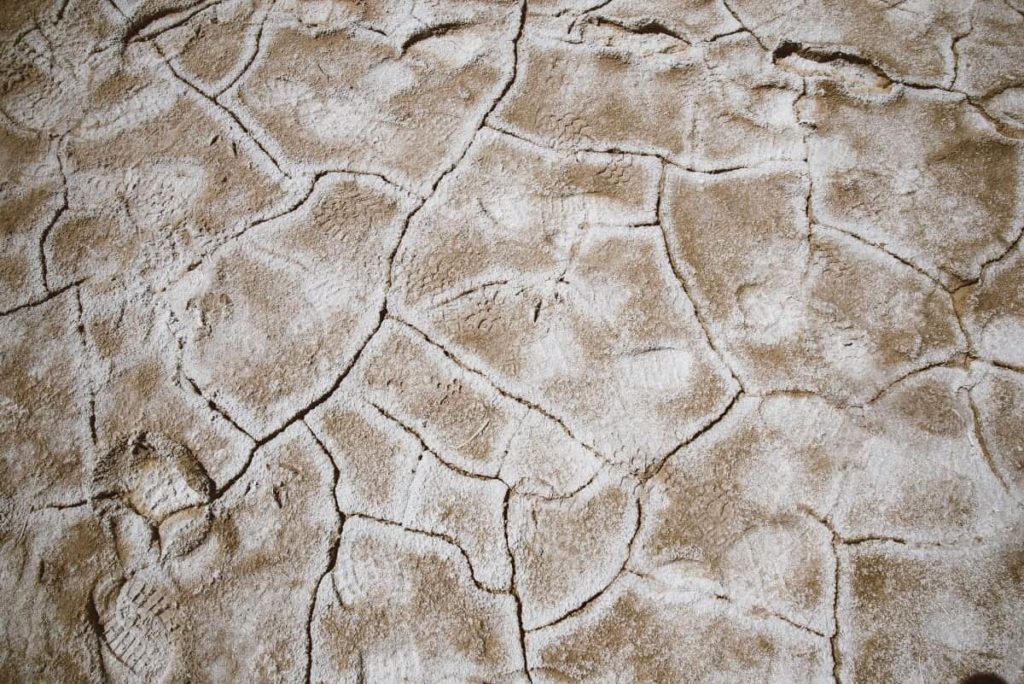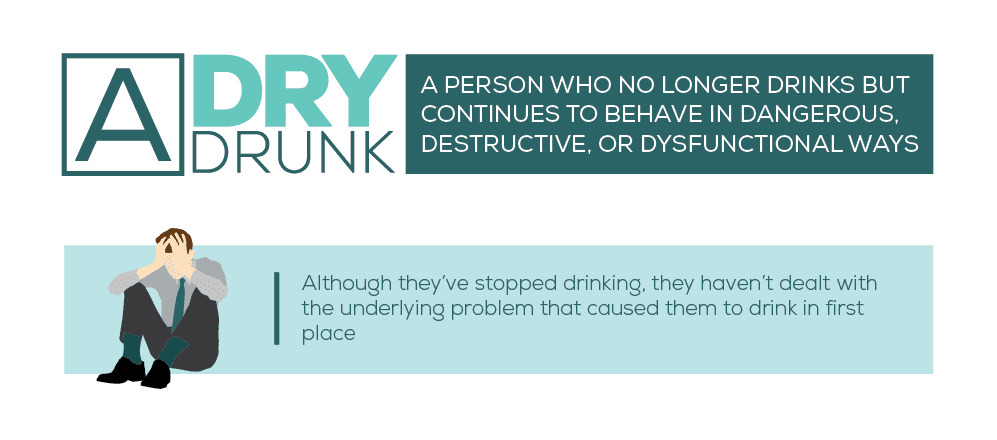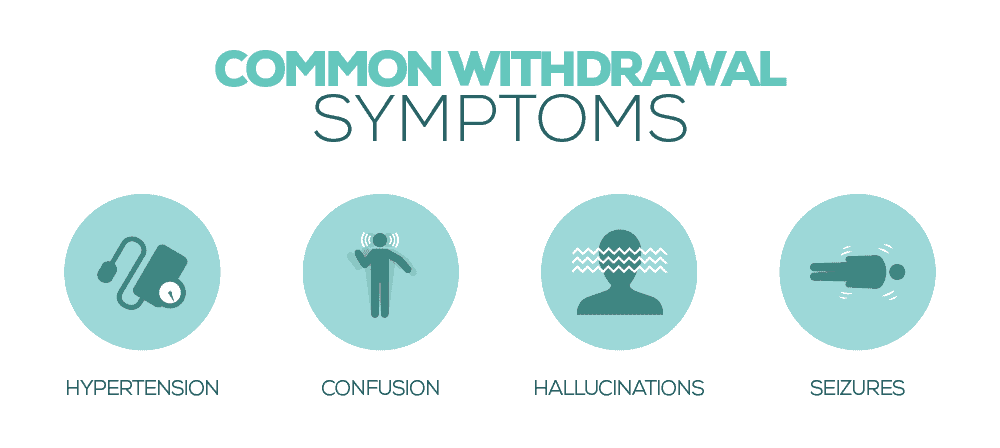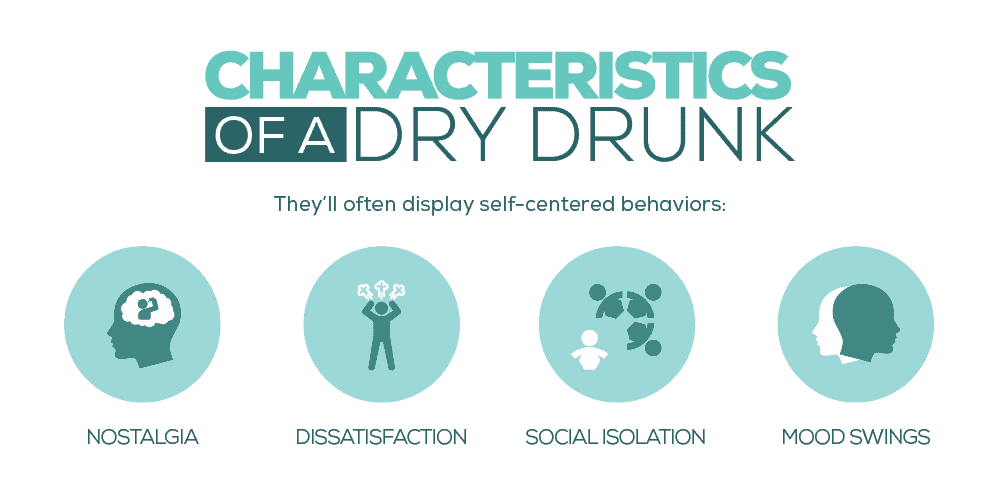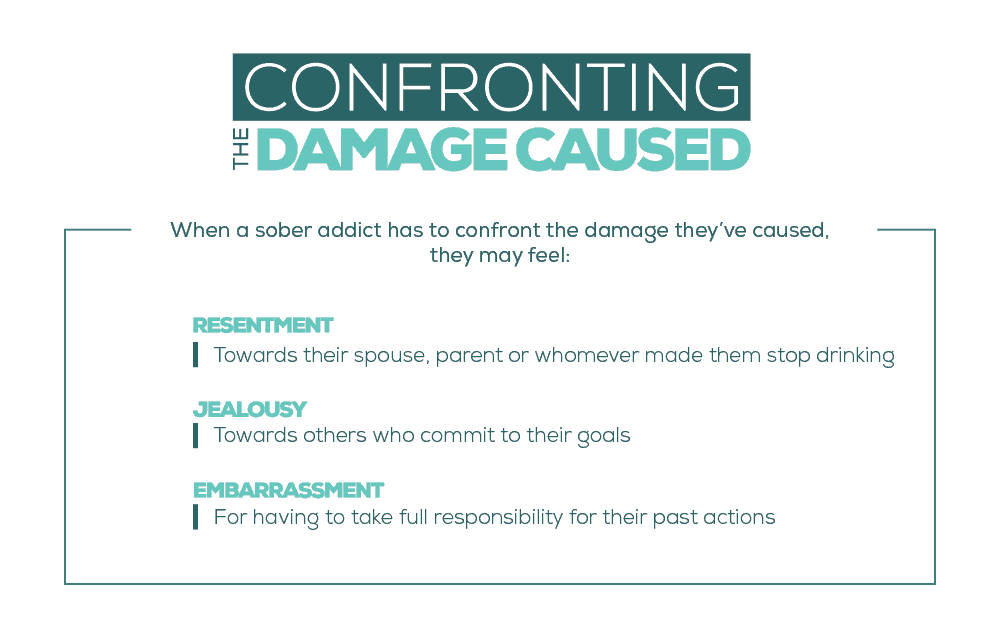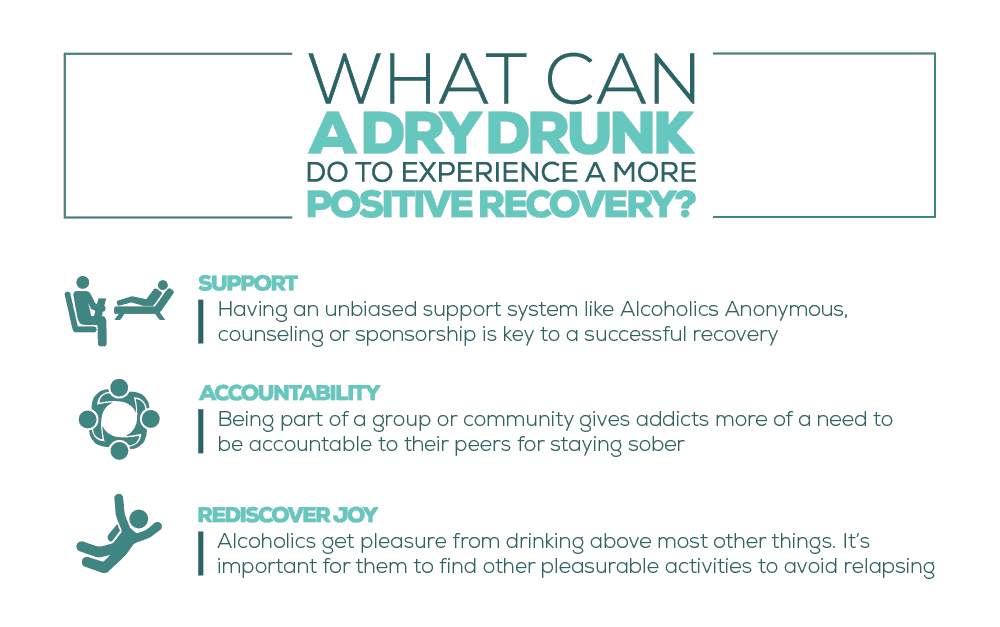“The ‘dry’ are as sick as the drunk, except that the bodily damage is not there. With every drunk there is a sick “dry” who is almost a mirror image.” ~Paul Molloy, Where Did Everybody Go? For someone whose life has been negatively impacted by alcohol abuse, the term “dry drunk” has two very different connotations, and taken as a whole, describes a situation that is just as out of control as active alcoholism. A person who is “dry” is abstaining from alcohol. This is a necessary first step in recovery. A person who is still drinking (or drugging) – no matter how “moderately” – is not truly sober. The very definition of addiction is the inability to control one’s consumption of drugs and/or alcohol. Because a dry drunk isn’t an active alcoholic, the tendency is to believe that behaviors have changed. Unfortunately, this is not always the case. The same behaviors can still be present, and quite often, they are.
What is a Dry Drunk?
In order to understand what a dry drunk is, you must first understand dry drunk syndrome. This is a term that comes from 12 Step recovery groups, like Alcoholics Anonymous. It means that the individual is no longer drinking, but still exhibiting the same behaviors. These dry drunk behaviors might come out as anger and resentment, among other behaviors. The only real change that has been made is to remove the alcohol. This has been done successfully. Changing the behaviors has not been done successfully. As you can imagine, this can make living with a dry drunk quite unbearable. “Drunk” in this context is a set of disruptive or destructive negative behaviors stemming from a pathological condition caused by past alcohol abuse. 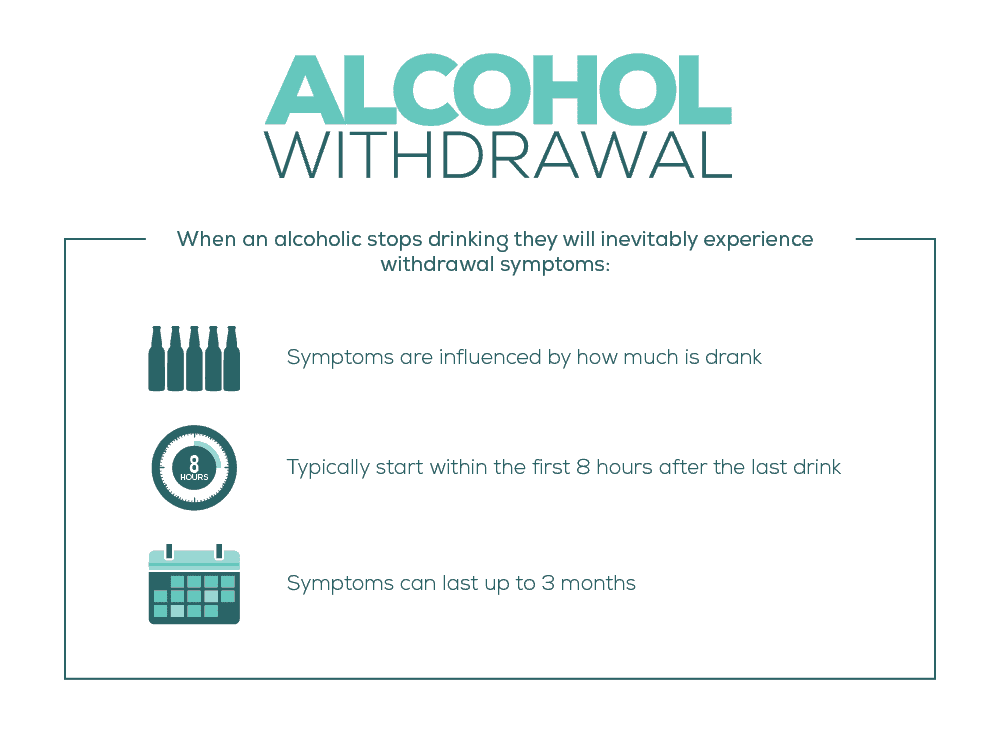
What Are Some Symptoms of Being a Dry Drunk?
One very important thought must be kept in mind – there is a difference between sober simply because you are abstaining from alcohol/drugs and being sober because you are also changing your feelings, attitudes, actions, and ways of thinking. Without these changes, a “white-knuckling” person who is still behaving in dysfunctional ways is jeopardizing their sobriety, and they are little more than a “ticking time bomb.”
- Grandiosity/Superiority – A dry drunk is self-centered, in much the same way that they were self-centered when they were actively drinking and drug-seeking.
- A constant need to be the center of attention
- Acting better or smarter than everyone else around them
- Playing the “victim”
- Believing that they are so unique that no one could possibly ever relate to them
- Impulsivity– Again, in much the same way as during active addiction, the dry drunk is unable to delay gratification. They want what they want when they want it, regardless of the consequences.
- Judgmental –Believing that they are superior, dry drunks will see everything and everyone around them as polar opposites – “Black or White” or “good or bad”, with emphasis on negativity.
- Intolerance –Related to superiority, dry drunks refuse to hear opinions or suggestions from anyone else. In their minds, they ALWAYS know best.
- Isolation –Dry drunks look for and magnify differences between themselves and those around them. This “separation mentality” can leave the individual without a strong support system.
- Boredom/Dissatisfaction – After the initial “rush” of newly-rediscovered sobriety, a person can get bored when they settle into a routine. When their sober life isn’t instantly perfect, they may even start to wonder why they got sober in the first place.
- Nostalgia –A dry drunk starts reminiscing – inaccurately – about the “fun” that they used to have – freedom, drinking/drug buddies, lack of responsibilities, etc.
- Mood Swings– As all of these symptoms start to come together, the dry drunk can start to become emotionally listless and aloof – as if nothing matters to them or makes a difference. Alternately, they can overreact and blow up with very little provocation.
Causes of the Dry Drunk
Now that you know some the dry drunk symptoms, you may have a lot of questions. One of those is probably, what causes someone to become a dry drunk? The main cause of dry drunk syndrome is the fact that recovering from alcoholism is so difficult. It is a dangerous process, and it can be a mentally and physically painful one as well. It’s not realistic to think that someone could stop drinking alcohol without any negative consequences. Too much has happened to the brain for that to be possible. 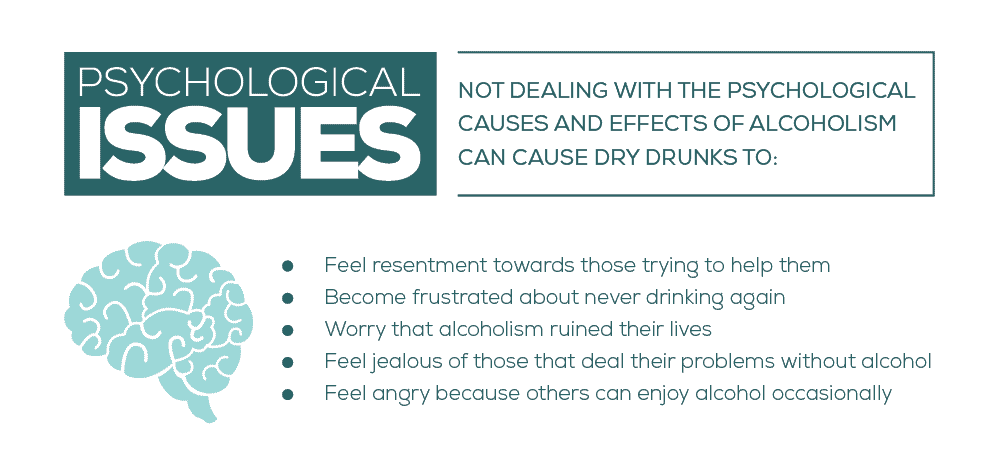
- Feel resentment toward the person who tried to help them stop drinking.
- Experience frustration about never being able to drink again.
- Worry that their drinking has ruined their lives.
- Worry about not having alcohol to fall back on.
- Feel jealous of others, who are able to deal with their problems without alcohol.
- Feel angry because others can enjoy alcohol without worrying about addiction.
- Feel upset because they have to face responsibility because of their drinking.
The healing process can be long and arduous for a recovering alcoholic. It takes time, but most people agree it is well worth it.
How to Prevent Being a Dry Drunk
If you’re an alcoholic now, you might be concerned about going through dry drunk syndrome. You’re right to be concerned. Becoming a dry drunk is a horrible way to live your life. Fortunately, there are things you can do to avoid it. The first way to avoid it is to be sure you attend alcohol treatment, and all of your follow up appointments. You have lived your life for so long as an alcoholic. Whether it has been several months or several years, alcohol has become a part of you. Treatment will help you understand how to live your life without alcohol being a factor. Secondly, you should consider going to Alcoholics Anonymous. It’s so important to surround yourself with others who are facing the same challenges as you. Right now, you may feel as though you’re all alone. AA will help you realize you’re not. Finally, you can help to prevent dry drunk syndrome by being mindful about your behaviors. You may want to try journaling as a way to help yourself work through some of your anger. It may also assist you with dealing with frustration and other dry drunk behaviors. No recovering alcoholic wants to be a dry drunk. You stop drinking to get rid of those behaviors, and you don’t want them to follow you. Take precautions now, and you may be able to prevent them.
How Can Being a Dry Drunk Affect Relationships?
One of the biggest characteristics of being a dry drunk is resentment. Once the alcoholic/addict has to soberly look at the damage their addictive behaviors have caused, they may not like what they see. If they don’t know how to handle these uncomfortable realizations, they can lash out in frustration at those closest to them.
- Resentment at the person who “made” them stop drinking/drugging
- Frustration that they can’t drink/use like “normal” people
- Disappointment that their substance abuse may have cost them opportunities to realize their dreams, goals, or full potential
- Embarrassment at having to take full responsibility for their past actions
- Fear of relapse and another failed recovery
- Jealousy of others who are in successful recovery
- Anger at friends and family members for living productive lives
All of the anger, resentment, and other dry drunk symptoms can leave family members feeling as if they need to walk around on egg shells to avoid sparking another argument. If family members are not themselves in some sort of supportive recovery such as professional counseling or Al-Anon/Narc-Anon, they may not even know what to expect from their abstaining-but-not-truly-sober loved one.
What Can a Dry Drunk Do to Experience a More Positive Recovery?
The number one thing that a recovering addict/alcoholic needs during recovery is an open mind – an acceptance of the fact that maybe – just maybe – they don’t have all the answers. They need to realize that their old thought patterns and coping mechanisms are what brought them to their current state of an unmanageable, out-of-control life.
- Be honest –A dry drunk has a greater support system then they probably know, and sometimes, just talking to someone about frustrations can help. If you are new to sobriety and experiencing dry drunk symptoms, tell your counselor, your sponsor, or a trusted family member. Honesty can keep a bad day from getting worse.
- Find/Rediscover Joy from Something Other than Drinking/Using–When your newly sober, you just might find yourself with a lot more time and energy on your hands. Eliminate boredom by finding a new passion. Having something productive or fun to do will keep your mind off of your old companion – addiction. Just a few suggestions might be:
- Take up a new hobby or rediscover one from the past
- Attend a class – either for self-improvement or just for fun
- Clean/redecorate your home – new lifestyle, new living space
- Volunteer – help yourself by helping others
- Start an exercise routine – sweat out those frustrations
- Meetings, meetings, meetings – be around other positive people in recovery
The First Step in Avoiding Dry Drunk Syndrome is Professional Alcohol Treatment
Northpoint Recovery inpatient drug and alcohol rehab that can help you learn new positive habits and life skills that can replace destructive and dysfunctional addictive behaviors. By using an individualized evidence-based strategy treatment strategy, Northpoint Recovery can show you how to do more than just abstain from substance abuse – we can show you how to recover. Moving into dry drunk behaviors is only going to make your recovery worse. That isn’t something you need as a part of your life. What you truly need is to embrace every aspect of your recovery. Doing so will help you learn the best ways to recover for you. It will also help you recapture the joy that your life has been missing.
Do you have questions about how you can avoid dry drunk syndrome? Do you need to learn more about alcohol rehab? Please contact us today to get the answers you need.
What Did you Think About This Blog?
Give it a Rating!

